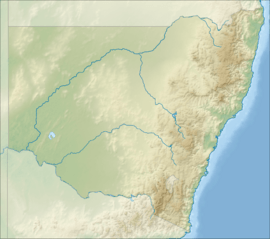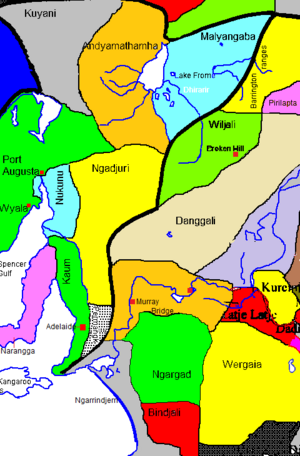Wilyakali facts for kids
The Wilyakali or Wiljaali are an Aboriginal group from the Darling River area in Far West New South Wales, Australia. Their traditional lands were around the towns of Broken Hill and Silverton. For a long time, it was thought that there were very few Wilyakali people left, or even none at all. But today, their descendants are still living in Broken Hill and nearby areas, keeping their culture alive.
Quick facts for kids Wilyakali LandsNew South Wales |
|
|---|---|
| Nearest town or city | White Cliffs |
Contents
What Does "Wilyakali" Mean?
The word kali in Wilyakali is an old term that means 'people'. You can find 'kali' in many tribal names from the Darling River valley, like Paakantyi (Creek People). So, Wilyakali means the Wilya people.
The Wilyakali Language
The Wilyakali language is part of the larger Paakantyi language family. Sadly, by the 1930s, very few people spoke the Wilyakali language, and it is now considered mostly extinct.
Where Did the Wilyakali Live?
The Wilyakali's traditional lands covered about 8,400 square miles (21,756 square kilometers). This area stretched from the Barrier Ranges west into South Australia, reaching places like Olary. It included Silverton, Mutooroo, and Boolcoomata. To the northwest, their land reached Mootwingee, and to the northeast, it went just south of Sturt Meadows.
It is believed that the Wilyakali people moved south in the early 1800s. They did this to avoid cultural pressures from the Ngadjuri people. The Malyangapa lived to their north, and the Yadliyawara were to their west.
Wilyakali Culture and History
The Wilyakali people shared many cultural ideas with groups to their north and west. This included mura stories, which are important traditional tales.
European Arrival and Its Impact
Historians believe that the Wilyakali population greatly decreased in the early 1900s. This was partly due to diseases brought by Europeans, which Aboriginal people had no natural protection against.
Wilyakali Today: Land and Management
In the 1980s, the Wilyakali people formed the Wilyakali Aboriginal Corporation. This group now manages Poolamacca Station. They also work on agreements for mining on their traditional lands and make Native Title Land Claims. This means they are working to have their rights to their traditional lands recognized by law.
Mutawintji National Park
The Wilyakali people are also joint managers of the Mutawintji National Park. This park was the first national park in NSW to be handed back to its traditional owners. Even though the Wilyakali people were once thought to be extinct, their descendants are now helping to manage this important area. Other Aboriginal groups also have claims to this land.
-
Mutawintji and river red gums
Important Cultural Places
-
Petroglyph of a brolga (a type of bird) in Wilyakala country
Important cultural places for the Wilyakali include the gullies of Mutawintji.
Other Names for Wilyakali
The Wilyakali people have also been known by other names, including:
- Bo-arli
- Bulali (meaning 'Hill people', from the word bula, which means hill)
- Wiljagali
- Wiljakali
- Wiljali
- Willoo
 | Emma Amos |
 | Edward Mitchell Bannister |
 | Larry D. Alexander |
 | Ernie Barnes |









